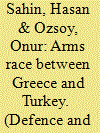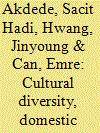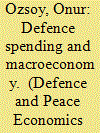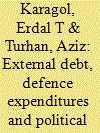| Srl | Item |
| 1 |
ID:
083235


|
|
|
|
|
| Publication |
2008.
|
| Summary/Abstract |
Two NATO allies, Greece and Turkey, have also been considered potential threats to each other. Thus, these countries' military spending has been subject to many academic studies to observe if these potential threats trigger the military spending of both countries. Nonetheless, most regression results of those studies did not find a significant result supporting the arms race between the two countries. The current study provides an additional empirical evaluation of military spending of both countries by using an annual data set running from 1958 to 2004. The study is in spirit of Smith et al. (2000) employing a Markov switching approach, but utilizing a longer period. A Markov switching approach allows estimation of military spending of each country if both sides compete with each other to have higher spending or if they behave independently of each other.
|
|
|
|
|
|
|
|
|
|
|
|
|
|
|
|
| 2 |
ID:
083238


|
|
|
|
|
| Publication |
2008.
|
| Summary/Abstract |
This study investigates the relationship between cultural diversity, political violence and public expenditures. Using a cross-section of cultural diversity indices, it is empirically examined whether cultural diversity caused or intensified political violence in the 1980s and 1990s. It is found that economic factors were statistically significant in the intensity of the violence in the 1980s, whereas political and cultural factors were significant in the 1990s. In addition, ethnic diversity took a significant role in both starting the violence and the intensity of it in the 1990s.
|
|
|
|
|
|
|
|
|
|
|
|
|
|
|
|
| 3 |
ID:
083234


|
|
|
|
|
| Publication |
2008.
|
| Summary/Abstract |
This study uses a six-variable vector autoregressive (VAR) model and analyses the relationship between defence spending as a percentage of GNP, government budget as a percentage of GNP, total deficit as a percentage of GNP, the GNP growth rates, inflation rates, and government budget deficit as a percentage of GNP for the case of Turkey from 1933 to 2004. The impulse response functions (IRFs) are also derived and Granger causalities among the variables estimated. The results support the short-run causality between defence spending and economic growth.
|
|
|
|
|
|
|
|
|
|
|
|
|
|
|
|
| 4 |
ID:
083236


|
|
|
|
|
| Publication |
2008.
|
| Summary/Abstract |
This paper investigates the relationship between external debt, defence expenditures and political business cycles in Turkey for 1960-2002. Here, two important aspects of the political business cycle, the electoral effects and the partisan effects, were investigated. The empirical finding of impulse response functions of defence expenditures to a shock in the partisan effect is positive. The results reported here indicate that political colours of parties appear to be important. This suggests that defence expenditure is influenced by political ideology and the fiscal policy of governments after elections. Moreover, the impulse response functions of external debt stock to shocks to the electoral effects and the response of external debt stock shocks to the partisan effects increased over the whole period.
|
|
|
|
|
|
|
|
|
|
|
|
|
|
|
|
| 5 |
ID:
083237


|
|
|
|
|
| Publication |
2008.
|
| Summary/Abstract |
This article investigates the possible role of the regional underdevelopment of South Eastern Turkey in the ensuing terrorism in the country. The article also aims at making a contribution towards a better understanding of some economic conditions that are related to terrorism. For this purpose, a novel approach to the examination of the roots of terrorism has been followed. First, we run Principal Components Analysis on total GDP and its components in South Eastern Turkey in order to reduce the number of potential explanatory variables. Second, we use the first three components in a logit regression where the dependent variable consists of an index of terrorist attacks. The results of the analysis have revealed that total GDP is helpful in explaining terrorism in Turkey. Furthermore, we find evidence that agriculture and government services are more important components of GDP in explaining terrorism than factors such as trade, construction, manufacturing and transportation.
|
|
|
|
|
|
|
|
|
|
|
|
|
|
|
|